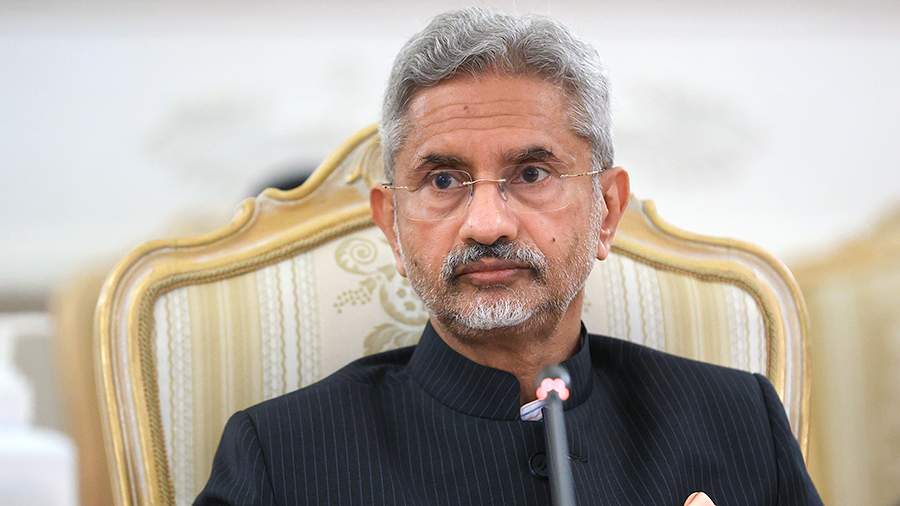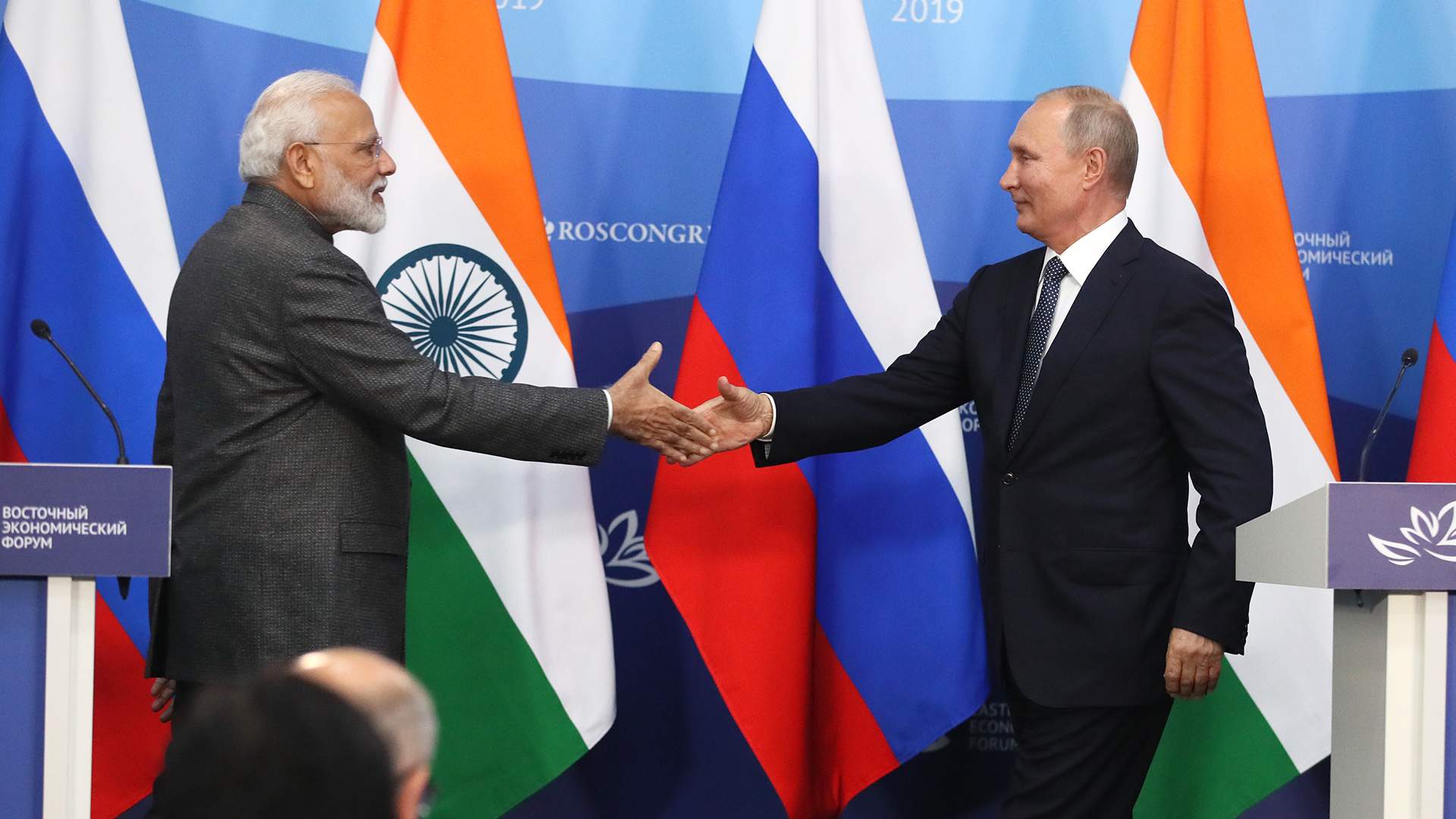- Home
- Consulate
-
Consular
- Visa-General Information
- Visa Service Charge
- Visa Service Centre
- Advisory for Visa Applicants
- Advisory for e-Visa applicants
- Simplified Business Visa Arrangement Between India and Russia
- Registration of Indian Nationals
- Passport Services
- Attestation Services
- OCI Services
- Information Related to Consular Services and Document Checklist
- Fee for Various Consular Services
- Forms
- Consular-General Information
- Indian Community in Russia
- Documentary filming in India
- National Voter Services Portal
- Электронная туристическая виза
- FAQ - Marital Disputes
- FAQs
- Bilateral Relations
- Media
- Science & Technology
- Education
- Culture
- Contact
- Vacancy
Press Releases
EAM’s Interview to Izvestia, 06 December, 2021
December 23, 2021
At a meeting between Russian President Vladimir Putin and Indian Prime Minister Narendra Modi in New Delhi, a number of agreements in the fields of energy, trade and defense can be expected to be signed. Indian Foreign Minister Subramanyam Jaishankar announced this in an interview with Izvestia. India is actively working to deepen ties with the Russian Far East, he said, despite the COVID-19 pandemic. In particular, the preparation of a feasibility study for the Eastern Sea Corridor (Chennai-Vladivostok), which will expand bilateral trade between the countries along the sea route, is nearing completion. On the eve of the summit of the leaders of the two countries on December 6, the head of Indian diplomacy explained what the decision to create a "2 + 2" format with Russia was based on, and also spoke about the interaction of the two countries in the Afghan direction and in the fight against coronavirus.

1. On the eve of the current summit, Russia and India will launch the first 2+2 dialogue between the foreign and defense ministers of the two countries. What motivated the need for such a format, given that the two countries already have fruitful cooperation both on the military front and through the ministries of foreign Affairs?

- The 2+2 Dialogue was announced following the telephone conversation between Prime Minister Narendra Modi and President Putin on April 28, 2021. India and Russia, being close strategic partners, have a dialogue with a broad and complex agenda. The establishment of a new format will provide a suitable platform to discuss inter-related and cross-cutting issues.
2. India currently has a 2+2 dialog with Australia, Japan and the US, and Russia will only be the fourth country with which it will have such an engagement. How the news was met among India’s QUAD allies, were there any concerns raised?
- Like many large nations, India pursues an independent foreign policy. Relations with its partner countries stand on their own merit. The decision to create a 2+2 format with Russia was based on our mutual desire to strengthen our Special & Privileged Strategic Partnership. That should be evident to the rest of the world.
3. At the leaders’ summit, the two sides are expected to finalize a number of agreements in the fields of defense, trade and investment, and science and technology. Would kindly elaborate more concretely on the most important agreements that are to be signed?
- Yes, a number of bilateral Agreements and MoUs on important areas, including energy, trade and investment, defence, cultural cooperation and people-to-people ties are expected to be finalised for the Bilateral Summit on December 6, 2021.
4. Two major defense deals awaiting conclusion are the AK-203 assault rifles and the Igla-S very short range air defense systems. Do you expect these deals will see progress at the summit?
- India-Russia cooperation in defence has long been an integral part of our strategic partnership. It is steadily transforming into one involving greater joint production and research in line with our policy of a self-reliant India. We have been adapting to these changes both in our respective national circumtances and the global situation. The specific details of agreements and contracts will be released by the Ministry of Defence.
5. The visit of Prime Minister Modi to Vladivostok in 2019 served as an impetus for the formation of a new Indian policy "Act in the Far East", which gives priority to interregional cooperation. Has the coronavirus become a hindrance in its development ?
- Prime Minister Narendra Modi’s visit to Vladivostok in 2019 reinvigorated our inter-regional cooperation with Russia, particularly the Russian Far East. It was there that he launched India’s Act Far East Policy with a clear intention of engaging with the region intensively. Our two countries have been working together to explore opportunities for joint collaboration in various sectors. We are also working towards expansion of our trade with the region. In the first half of 2021, that has increased significantly compared to the same period last year. Both our leaders put special emphasis on developing ties between different states of India and regions of the Far East.
Despite Covid-19 pandemic, we have been actively working with Russia to deepen our ties with the Far East. Following the visit of PM to Vladivostok in 2019, there have been a series of high-level visits including the visits by two successive Ministers of Petroleum & Natural Gas to Vladivostok – the recent one being at the Eastern Economic Forum 2021 in September. This year, India had the largest physical delegation from any country at the Forum. Prime Minister also addressed the Plenary Session which was attended by President Putin, where he highlighted India’s abiding interest in engaging constructively and substantially with the Russian Far East. President Putin acknowledged the concept of “Sangam” (implying, according to Narendra Modi's definition, that Vladivostok is the place of the "confluence" of Eurasia and the Indo-Pacific region - Izvestia).
Further, we have continued to put systems and institutions in place to enhance our engagement with the region. We have commissioned an economic feasibility study of the Eastern Maritime Corridor to analyse enhancing bilateral trade through the maritime route, which is nearing completion. We continue to maintain close contact with the regions of the Far East through a series of virtual meetings. Recently, Government of Gujarat also extended invitations to the Governors of the Russian Far East to attend the Vibrant Gujarat Summit next year. This is a clear signal of our continued interest in engagement with the Far East.
6. Before the Taliban came to power in Afghanistan, Russia and India differed significantly in their attitude to the movement. How close are the views of the two countries on what is happening in this country now? And what specific areas of cooperation do New Delhi and Moscow have with regard to the Afghan issue?
- The recent developments in Afghanistan have a direct impact on the region and our respective interests. Terrorism, regional instability, drug trafficking, humanitarian assistance, etc. are common concerns which can be tackled only through joint efforts. So, it is only natural that India and Russia cooperate closely. In August, 2021, our leaders agreed on creating a permanent consultative mechanism between India and Russia headed by national security advisers (Ajit Doval from the Indian side and Nikolai Patrushev from the Russian side.). It’s first meeting was held in September. India officially participated in the Moscow Format Meeting on Afghanistan. Likewise, we saw participation of Secretary of Russian Security Council, Nikolai Patrushev, in the Delhi Regional Security Dialogue. So, our engagement is on-going.
7. India and Russia have already established good cooperation in the field of vaccines against COVID-19 and Sputnik V vaccine is the only one- apart from Indian-made Covishield and Covaxin- drug available to Indians. How popular the Russian vaccine in India?
- India and Russia have been cooperating in the fight against Covid-19 since the onset of the pandemic. Our cooperation has included humanitarian assistance, vaccine trials and production, and repatriation of each other’s citizens. Sputnik-V was the first foreign vaccine to have received recognition for use in India. While its use was not extensive, the message of international cooperation that is conveyed is an important one.
Original Source: https://iz.ru/1259757/nataliia-portiakova/nashe-sotrudnichestvo-v-oborone-transformiruetsia-v-rasshirenie-proizvodstva










